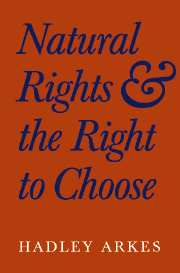Book contents
- Frontmatter
- Contents
- Acknowledgments and Dedication
- ONE Introduction: Backing into Treason
- TWO The Drift from Natural Rights
- THREE On the Things the Founders Knew – and How Our Judges Came to Forget Them
- FOUR Abortion and the “Modest First Step”
- FIVE Antijural Jurisprudence
- SIX Prudent Warnings and Imprudent Reactions: “Judicial Usurpation” and the Unraveling of Rights
- SEVEN Finding Home Ground: The Axioms of the Constitution
- EIGHT Spring Becomes Fall Becomes Spring: A Memoir
- Postscript, January 2004
- Index
TWO - The Drift from Natural Rights
Published online by Cambridge University Press: 05 June 2012
- Frontmatter
- Contents
- Acknowledgments and Dedication
- ONE Introduction: Backing into Treason
- TWO The Drift from Natural Rights
- THREE On the Things the Founders Knew – and How Our Judges Came to Forget Them
- FOUR Abortion and the “Modest First Step”
- FIVE Antijural Jurisprudence
- SIX Prudent Warnings and Imprudent Reactions: “Judicial Usurpation” and the Unraveling of Rights
- SEVEN Finding Home Ground: The Axioms of the Constitution
- EIGHT Spring Becomes Fall Becomes Spring: A Memoir
- Postscript, January 2004
- Index
Summary
Blackstone, that venerable commentator on the English law, insisted that it was a chimera or an oxymoron to suggest that the law may contain a principle of revolution. Laws were settled rules; revolutions involved the overturning of the deepest rules, the unsettling of that which had been most deeply settled. And yet, what Sir William Blackstone regarded as a contradiction in terms, James Wilson regarded not only as plausible, but as an understanding that ran to the foundation of the law in America. In his first lecture on jurisprudence, in 1790, Wilson insisted that “a revolution principle certainly is, and certainly should be taught as a principle for the constitution of the United States, and of every State in the Union.”
As paradoxical as that may sound, Wilson recognized that it was simply an implication that flowed from the understanding of natural rights or natural justice. For natural right implied an understanding of what was just or right apart from the positive law, the law that was “posited,” enacted, set forth in official statutes and decrees. Built into the logic of natural rights, one might say, was a recognition that the positive law, a “law” established in a thoroughly legal manner, may nevertheless be wanting in the substance of justice or lawfulness. For that reason, a statute might not be “lawful” in the strictest sense even if it were passed with a thorough respect for the forms of law.
- Type
- Chapter
- Information
- Natural Rights and the Right to Choose , pp. 11 - 33Publisher: Cambridge University PressPrint publication year: 2002



